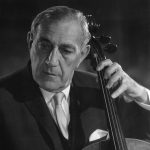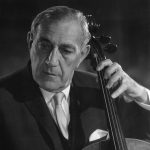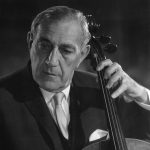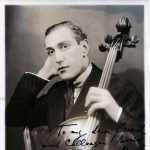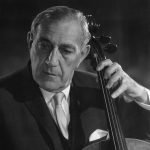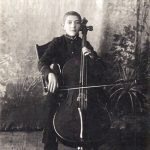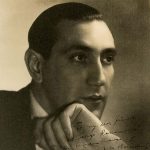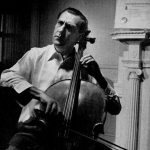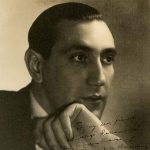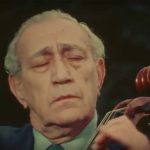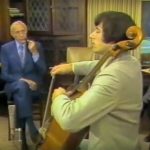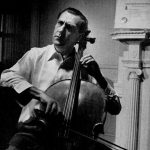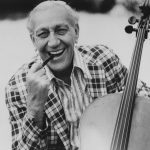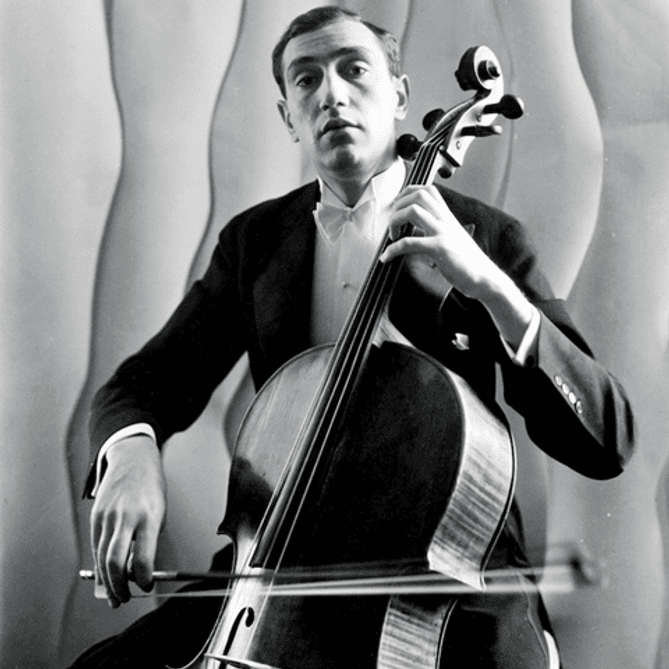
Gregor Piatigorsky
by ROBERT BATTEY (active Washington DC area cellist, teacher and writer)
One of the pre-eminent string players of the 20th century, Gregor Piatigorsky was born in Ukraine in 1903, and died in Los Angeles in 1976. His international solo career lasted over 40 years, and especially during the 1940’s and early 1950’s he was the world’s premier touring cello virtuoso — Casals was in retirement, Feuermann had died, and the three artists who were to succeed Piatigorsky (Starker, Rose, and Rostropovich) were still in their formative stages. His one true peer, Fournier, was limited in his travelling abilities by polio. Thus, Piatigorsky had the limelight almost to himself. He was gregarious, loved to travel and perform anywhere, and he hobnobbed as easily with farmers in small towns as he did with Toscanini, Stravinsky, Rubinstein, and Schoenberg. It was a legendary career.
Piatigorsky was not a “child prodigy,” perhaps, but his talent manifested itself early and carried him quickly upward. He began to play at age 7, and was accepted as a student at the Moscow Conservatory two years later. By age 15 he was principal cellist of the Bolshoi Opera. Escaping the upheaval of the Russian Revolution in 1921, he studied with Julius Klengel (also Feuermann’s teacher) in Leipzig, and at age 21 became principal cellist of the Berlin Philharmonic under Furtwängler. In 1929 he left the orchestra to pursue a solo career. Piatigorsky always loved chamber music, and was a member of three different piano trios – first with Artur Schnabel and Carl Flesch, next with Vladimir Horowitz and Nathan Milstein, and finally with Artur Rubinstein and Jascha Heifetz.
by TERRY KING (Longy School of Music, Hartt School of Music)
The life of Gregor Piatigorsky is well known—his rise from the impoverished Moscow of the World War I years to solo cellist of the Bolshoi Theatre at 15; His dangerous escape to Poland, where he quickly became solo cellist of the Warsaw Philharmonic and in turn, the Berlin Philharmonic by his 21st birthday.
Piatigorsky’s formal training was of limited value as he was basically self-taught. His teachers included Alfred von Glehn (student of Davidov, the father of the Russian School), Brandukov (Cossmann and Fitzenhagen), and briefly with Hugo Becker (Piatti and Grutzmacher) and Julius Klengel—both in Brahms’ circle.
From 1929 on he was exclusively a soloist and was enormously successful. He performed with all the great orchestras and conductors of the era and many composers wrote enduring works for him including Stravinsky, Hindemith, Prokofiev, Milhaud, Martinu and Walton.
Piatigorsky first taught in Berlin in the 1920s and then at the Curtis Institute in the 1940s. In the 1960s he joined Jascha Heifetz and William Primrose at USC where his master classes became famous.Gregor Piatigorsky’s teaching legacy is palpable today, as it has been for generations. Piatigorsky trained the principal cellists of leading orchestras in Boston, New York, Chicago, Dallas, Houston, San Francisco, Cleveland, Pittsburgh, Minneapolis, Philadelphia, Washington DC, Berlin, London, Vancouver, Toronto and many more. Among soloists and chamber notables are Nathaniel Rosen, Leslie Parnas, Steven Isserlis, Raphael Wallfisch, Jeffrey Solow, Paul Tobias, Mischa Maisky, Denis Brott, Erling Blöndal Bengsston, Stephen Kates, William De Rosa, Gert von Bülow, Paul Katz and Laurence Lesser who owe much to their study with Piatigorsky. His students also occupy important teaching positions in leading conservatories and universities, perpetuating his example for future generations.
by ROBERT BATTEY (excerpt)
Piatigorsky moved to America in 1939, becoming a US citizen three years later.
There are too many highlights in his career to mention them all. His annual tours took him throughout the world, appearing with the greatest orchestras and conductors of the time. He made the first recording of the Shostakovich Sonata, collaborated with Stravinsky on his Suite Italienne, premiered the Hindemith Concerto of 1940 and Sonata of 1948, and commissioned or premiered many other works including the Walton Concerto in 1957. He was also a prolific arranger, and many of his transcriptions are published and performed the world over.
“I’ll stop teaching when I stop learning.” – Piatigorsky
“The best thing a musician can possibly do after he has acquired a great deal of experience is to pass it on to younger musicians. So many people are now gone — Kreisler, Toscanini, Rachmaninoff — who never had students. This is a great loss, and we must not repeat the mistake.” – Piatigorsky
by ROBERT BATTEY
Piatigorsky was a very tall man, well over six feet, and he handled his Stradivarius like a toy. He would stride briskly onstage through the orchestra, holding the instrument horizontally with one hand, like a lance. He often closed his eyes and turned his handsome face to his right as he played, giving a regal bearing to his performing profile. Due to his size, all the basic playing actions were simple for him; he had a huge sound, and drew full bows with same effort and extension that a smaller player like Casals needed for only half the bow. He could produce the widest spectrum of colors, from any spot on the bow. He delighted in quick changes of articulation, even if just for a few notes. Most dazzling of all was his staccato stroke, which is wonderfully showcased in a Kultur video entitled “Heifetz/Piatigorsky.” There, in an arrangement he made of some Schubert Variations, he displays both a down- and up- bow staccato that is almost beyond belief, along with many other signature effects. His own set of variations on the famous 24th Caprice of Paganini is a minefield of specialized bowing challenges; no one has been able to play it with his ease and flair, though many have tried. His left hand too was a law unto itself; reaching 1-4 octaves in the lower positions was easy and natural for him, and he ambled nimbly and effortlessly around the fingerboard. Trills were, again, “electric,” and he drew incomparable richness from the lower strings. However, not all listeners were taken with his vibrato. Given his size, he apparently had trouble controlling the full-arm motion that most cellists learn, and was more comfortable producing the vibrato from a wrist motion alone. This gave the sound a nasal quality at times. And, since he had to work less hard to produce the vibrato, he did not always attend to it with the care that someone with more ordinary gifts would, and some passages in his recordings grate on listeners brought up on the buttery sounds of Rose or Fournier. In his later years, this technique also began to effect his intonation. On balance, though, his playing displays a combination of stylishness, verve, and humanity that no one has ever matched.
To read more about Piatigorsky’s life, performance career and teaching, turn to Terry King’s biography of Piatigorsky: Gregor Piatigorsky: The Life and Career of the Virtuoso Cellist (McFarland & Co., 2010).
The following quotes illuminate Piatigorsky’s unique ways of communicating with, challenging and inspiring his students. “Many people are too small to teach, but no one is too big.”
“It is not the job of the teacher to make an adoring audience of his students.”
“Of all the titles applied to me, I like “teacher” best of all.”
“For me, the most important part of music is what I call an “overall balance”: 1. Head – intellect; 2. Heart – emotions, feelings; 3. Technical skills – ability to communicate ideas.
“The first thing I impress is the need of a thorough understanding of the musical thought to be conveyed: that the work should be memorized and performed mentally. It should be sung. CPE Bach wrote that you must sing; you never sing as unmusical as you play.”
“The structure of the composition should be studied and understood, and each phrase weighed as to its meaning in the whole. Allow it to inspire you. Spend much time with it in your thoughts.”
“Ours is a single-note instrument, so we have to play well one note at a time; every note must be good. You must imagine that you are in an auction, and every single note has to be so good that you can sell it without any argument! Every note must have quality, as if all by itself it is some kind of melody.”
“Forget about modesty; be a show-off. There has never been written a modest symphony, a humble rhapsody. You must be able to say with great feeling, ‘I hate you’ or ‘I love you.’ Once you are able to say that, you will find you can play the cello.”
“It’s very important not to play very ‘importantly.’ If you begin to play a fairly easy, gay and amusing piece with great importance, then the piece becomes less important than the player. If the piece is simple and gay, then the cellist must be simple and gay.”
by ZUBIN MEHTA (Music Director of Montreal, Los Angeles, Israel, and New York Philharmonic Orchestras)
It was with the greatest awe that I looked forward to my first meeting with Gregor Piatigorsky. At dinner after one of his celebrated chamber-music concerts in 1961 with Jascha Heifetz, I asked him just one question regarding his recollections of Richard Strauss’ conducting of Don Quixote. His reply took over the rest of the evening. As a matter of fact, it continued for the next 15 years through endless hours of conversations and quite a few of concerts.
I cannot forget the first of these performances. It was born out of a
talk while we were swimming off Puerto Rico in 1967. We both
had been invited by Pablo Casals to perform at his festival. Piatigorsky’s Don Quixote was one of such beauty that during the great F-sharp-major variation I turned for a glimpse of Casals, who always sat in the wings. He was weeping. I think at one point or another all of us were weeping.
For my part, I had joined a colleague with whom I breathed musically with such complete oneness that after a performance of a work that took just over 30 minutes, we found ourselves closer than six previous years of discussing that same work had brought us. Communication between two musicians on a spiritual level is a phenomenon that cannot be defined accurately—it is more the unspoken word—the meaning that lies between the notes that draws us closer to one another.
by PAUL KATZ (Cleveland Quartet, New England Conservatory of Music) (excerpted from an Internet Cello Society interview of Paul Katz with Tim Janof)
It was my senior year at USC when my teacher, Gabor Rejto went on sabbatical, and as luck would have it, it was the same year that Piatigorsky, Primrose, and Heifetz joined the USC faculty. I auditioned for Piatigorky and became one of the students in his very first class at USC. I loved that year with him, but I had never yet been away from home (Los Angeles) and I had always dreamt of going to New York. So after one year I left for the Big Apple to study with Greenhouse, got a Masters Degree, and then returned to Piatigorsky for a second time.
I don’t recall his class being particularly competitive. We were all good cellists, and Piatigorsky, consciously or not, seemed to appreciate each of us for our own uniqueness. The atmosphere was supportive and Piatigorsky was a father figure to us all. Having said this, I must admit that those years were extraordinarily stressful for me because I found it difficult to please Piatigorsky. All lessons were in a master class format which meant that all criticism, even that which most teachers would save for private moments, was done publicly. Those classes could be very trying and some of us suffered more than others. The classes were held every Monday and Thursday from ten in the morning to three in the afternoon, which could be a long five hours.
He wanted to help everybody find their own personality and to be strong communicators. I thought of myself as being musically communicative at the time, but I was still shy as a person and he was such an immense extrovert that he could intimidate me. It wasn’t easy, but in the end he was very helpful in getting me to throw off my inhibitions and to absolutely go for the jugular when I performed.
Piatigorsky was a larger-than-life personality and he had an enormous sense of humor, and the way I remember it was that he got many of his laughs at the expense of the student in the chair. He was tough, and he liked being the center of attention. It was all in good fun and most of the stories and the jokes that he told had a pedagogical purpose, but making fun of the person in the hot seat was part of the arrangement. Actually, I doubt that everyone in the class would characterize it in this same way—probably at 19, I was just a little too fragile. Some of us seemed traumatized, but others, particularly Steve [Kates] and Larry [Lesser], at least on the outside, appeared unbothered. I think we all enjoyed it when somebody else was up there.
He would try to stimulate our imagination in every way possible and was more interested in hearing a statement of conviction than whether what was being done was interpretively good or bad. It could feel quite liberating.
Imagination also meant writing our own cadenzas and even improvising in class. Being on the shy side, I found it extremely difficult to improvise in front of anyone, not to mention Piatigorsky and all my exceptionally talented colleagues.
He gave us lots of exercises, like 3+1 bowings, where we might play a rapid three-octave scale at the frog, three notes slurred, one note separate, and then repeat it, three notes slurred, one note separate, but over the course of the scale, gradually and evenly move the bow out to the tip. Then we’d do the same thing while staying at the tip, and repeat 3+1 one more time while moving back to the frog. We would then repeat the whole three octaves x3 again with the same patterns, but starting up-bow. He was brilliant when it came to playing and teaching bow distribution and painting colors with bow speed.
He also focused on expanding our dynamic range. He talked about playing softer and softer and softer, or louder and louder and louder, which he said was the equivalent of “a painter with more colors on his palette.”
Piatigorsky was interested in everything that had to do with performance, including things that we might laugh at now. When I first joined Piatigorsky’s class I was excited that I was going to be studying with the ‘Great Grisha,’ so for the big occasion, I went out like a good Californian and bought a new orange short-sleeved shirt. The shirt was made from a then new material called Ban-Lon, which was like a nylon golf shirt. When I entered the room for our very first class, he immediately threw me out, telling me to come back in a suit and tie. He didn’t act angry or offended, he just ridiculed me for not knowing how to present myself. This was the first of many times when being the butt of his humor wasn’t fun. I was humiliated, actually.
I returned three days later to the next class meeting and he threw me out again, this time because the suit I wore per his instructions, was not properly tailored! The sleeves were a bit long for high fashion and hung slightly over my hands. He gave me a lesson in how the shirt cuffs needed to be 2″ longer than the jacket sleeves, so that the cuff (and the all-important cuff links) were visible when in playing position. Then he told me to go have my suit properly tailored. That is actually the very first thing Piatigorsky taught me! But this was an important pedagogical lesson as far as he was concerned, because how we walk and how we bow, how we sit at the instrument, how we dress, and how we carry ourselves on stage was an important part of what he taught us. And while some of this seems outdated and extreme, I think that the visual side of performing does count, and what he taught me in principle helped me in my performing career.
History
Schubert: Introduction, Theme and Variations, Op. 82, #2, arr. Piatigorsky
Performance of Schubert: Introduction, Theme and Variations, Op. 82, #2, arr. Piatigorsky
Piatigorsky plays Walton Cello Concerto: Moderato
With the Boston Symphony Orchestra, conducted by Charles Munch. Symphony Hall, Boston, 1/28/1957.
An Afternoon with Gregor Piatigorsky
A documentary film about famed cellist Gregor Piatigorsky. Directed, photographed and edited by Steve Grumette.
Master Class: Bloch Schelomo, B.39
Emanuel Gruber performing Ernest Bloch's "Schelomo" in a master class with Gregor Piatigorsky. July 26, 1972.
